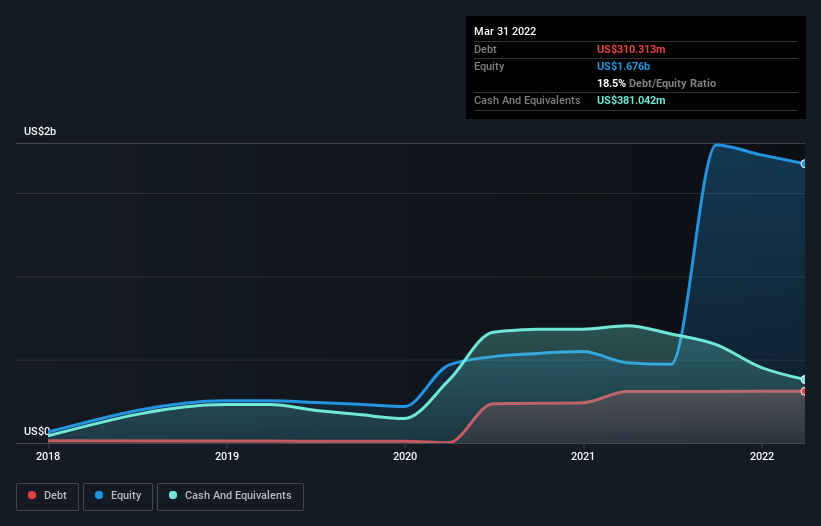- United States
- /
- Healthcare Services
- /
- NasdaqGS:ONEM
Is 1Life Healthcare (NASDAQ:ONEM) A Risky Investment?

Warren Buffett famously said, 'Volatility is far from synonymous with risk.' When we think about how risky a company is, we always like to look at its use of debt, since debt overload can lead to ruin. We note that 1Life Healthcare, Inc. (NASDAQ:ONEM) does have debt on its balance sheet. But is this debt a concern to shareholders?
Why Does Debt Bring Risk?
Debt is a tool to help businesses grow, but if a business is incapable of paying off its lenders, then it exists at their mercy. Ultimately, if the company can't fulfill its legal obligations to repay debt, shareholders could walk away with nothing. However, a more frequent (but still costly) occurrence is where a company must issue shares at bargain-basement prices, permanently diluting shareholders, just to shore up its balance sheet. Having said that, the most common situation is where a company manages its debt reasonably well - and to its own advantage. When we examine debt levels, we first consider both cash and debt levels, together.
Check out our latest analysis for 1Life Healthcare
What Is 1Life Healthcare's Debt?
As you can see below, 1Life Healthcare had US$310.3m of debt, at March 2022, which is about the same as the year before. You can click the chart for greater detail. However, its balance sheet shows it holds US$381.0m in cash, so it actually has US$70.7m net cash.

How Healthy Is 1Life Healthcare's Balance Sheet?
According to the last reported balance sheet, 1Life Healthcare had liabilities of US$221.1m due within 12 months, and liabilities of US$699.1m due beyond 12 months. Offsetting this, it had US$381.0m in cash and US$142.7m in receivables that were due within 12 months. So its liabilities total US$396.5m more than the combination of its cash and short-term receivables.
This deficit isn't so bad because 1Life Healthcare is worth US$1.64b, and thus could probably raise enough capital to shore up its balance sheet, if the need arose. But it's clear that we should definitely closely examine whether it can manage its debt without dilution. Despite its noteworthy liabilities, 1Life Healthcare boasts net cash, so it's fair to say it does not have a heavy debt load! When analysing debt levels, the balance sheet is the obvious place to start. But ultimately the future profitability of the business will decide if 1Life Healthcare can strengthen its balance sheet over time. So if you want to see what the professionals think, you might find this free report on analyst profit forecasts to be interesting.
In the last year 1Life Healthcare wasn't profitable at an EBIT level, but managed to grow its revenue by 79%, to US$756m. With any luck the company will be able to grow its way to profitability.
So How Risky Is 1Life Healthcare?
We have no doubt that loss making companies are, in general, riskier than profitable ones. And the fact is that over the last twelve months 1Life Healthcare lost money at the earnings before interest and tax (EBIT) line. Indeed, in that time it burnt through US$234m of cash and made a loss of US$306m. But the saving grace is the US$70.7m on the balance sheet. That means it could keep spending at its current rate for more than two years. 1Life Healthcare's revenue growth shone bright over the last year, so it may well be in a position to turn a profit in due course. Pre-profit companies are often risky, but they can also offer great rewards. The balance sheet is clearly the area to focus on when you are analysing debt. However, not all investment risk resides within the balance sheet - far from it. For example, we've discovered 3 warning signs for 1Life Healthcare that you should be aware of before investing here.
If you're interested in investing in businesses that can grow profits without the burden of debt, then check out this free list of growing businesses that have net cash on the balance sheet.
New: AI Stock Screener & Alerts
Our new AI Stock Screener scans the market every day to uncover opportunities.
• Dividend Powerhouses (3%+ Yield)
• Undervalued Small Caps with Insider Buying
• High growth Tech and AI Companies
Or build your own from over 50 metrics.
Have feedback on this article? Concerned about the content? Get in touch with us directly. Alternatively, email editorial-team (at) simplywallst.com.
This article by Simply Wall St is general in nature. We provide commentary based on historical data and analyst forecasts only using an unbiased methodology and our articles are not intended to be financial advice. It does not constitute a recommendation to buy or sell any stock, and does not take account of your objectives, or your financial situation. We aim to bring you long-term focused analysis driven by fundamental data. Note that our analysis may not factor in the latest price-sensitive company announcements or qualitative material. Simply Wall St has no position in any stocks mentioned.
About NasdaqGS:ONEM
1Life Healthcare
1Life Healthcare, Inc. operates a membership-based primary care platform under the One Medical brand.
Mediocre balance sheet with concerning outlook.
Similar Companies
Market Insights
Community Narratives




